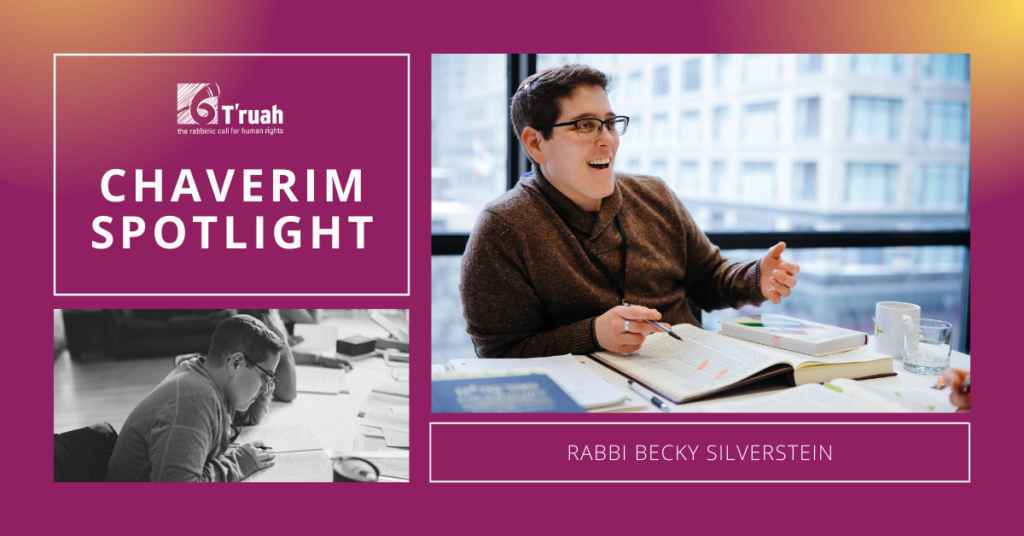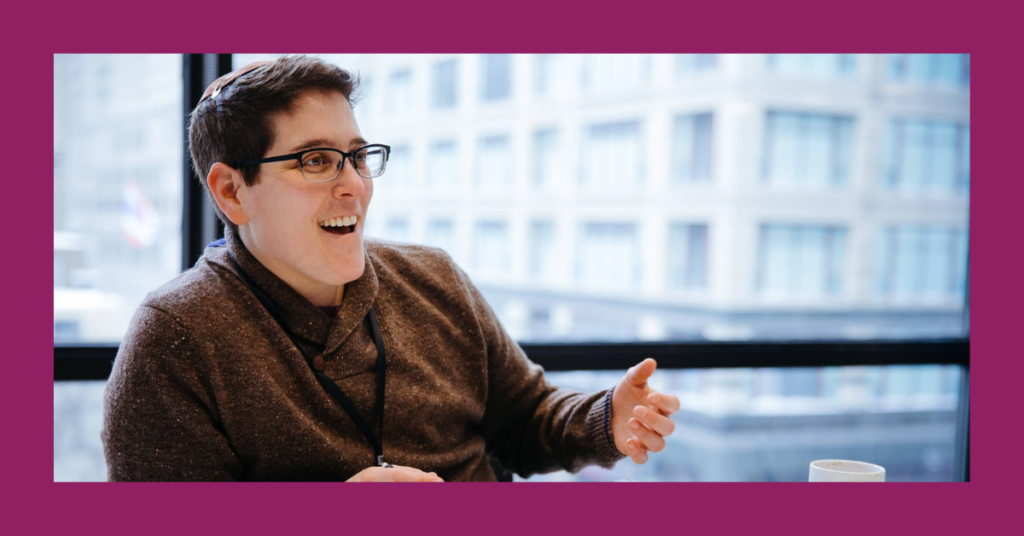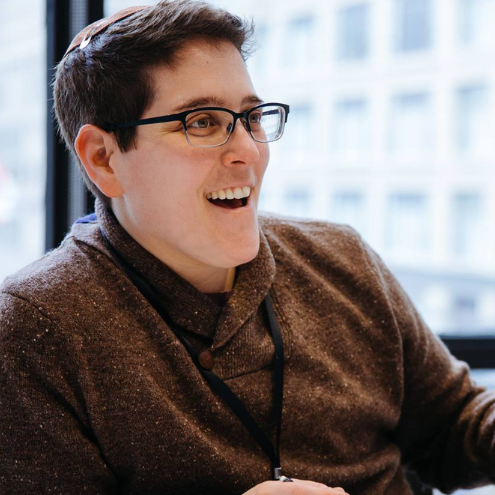
Rabbi Becky Silverstein is a co-chair of the T’ruah Boston cluster. He is also Board Chair of SVARA: A Traditionally Radical Yeshiva, Board Chair of the Jewish Studio Project, and was a longtime board member of Keshet, an organization that works for the full equality of LGBTQ Jews in Jewish life. He also co-founded the Trans Halakhah Project, which is housed at SVARA. T’ruah spoke with Rabbi Silverstein in fall 2021. This interview has been edited for clarity.
T’ruah: Tell me a little bit about yourself. What do you do?
Rabbi Becky Silverstein: These days, first and foremost, I am a resource for people. I spend time out in the Jewish world, responding to questions about the intersection of Torah and what’s happening in the world and how Judaism can be brought to bear to make meaning of that. Whether that’s stuff around economic justice, or racial justice, or climate change (which I know way less about), or around parenting. These days I’m mostly a dad. I’m also continuing to serve as a resource to queer and trans Jews, which is an extension of the work that I did with Keshet for the better part of the last decade. I spend a good amount of time hanging out with queer and trans Jews and telling them “Judaism is here for you.”
T: Is that what drew you to becoming a rabbi?
BS: The truth is wanting to learn and wanting to feel grounded in Judaism myself, is what drew me to be a rabbi. That’s one side of it. But I was also drawn to becoming a rabbi to be able to be in intimate relationships with people in the most joyful and most painful moments of their life. And I wanted to be grounded in Judaism such that I could be a presence and aid in meaning making, as they moved through this world.
T: Did you imagine activism would be part of your rabbinate?
BS: I really didn’t imagine doing much at all. You know, I think I entered rabbinical school with a very vague sense of what rabbis do.
I had a personal drive, which was motivated by dissatisfaction with my Jewish upbringing and education, and also this vague, professional sense that rabbis were important in people’s lives in those moments. And so those two things together meant that I should go to rabbinical school, and that I should go to Hebrew College, where I could really dive into texts, learn the skills necessary to be a rabbi, and do the spiritual growth necessary to be present with people in those big life moments.
T: You worked in a shul before your current role. What did it look like to do political work in a shul context versus outside it?
BS: My time in a shul context feels relatively short and not that recent! Having said that, when I was serving as Education Director and holding rabbinic responsibilities at Pasadena Jewish Temple and Center, I was much more deeply aware of my relationships with congregants. There were times when I did political work outside the congregation, like working with CLUE to support nurses who were in the process of unionizing or participating in the Transform:CA campaign. In other moments, I was asking myself how to best engage congregants in this work or in conversation about my political work. I wasn’t able to explore this as fully as I would have liked.
In rabbinical school, my internship was two years at Congregation Kehillath Israel in Brookline, Massachusetts. That time was less about politics, and more about learning liturgy, running minyan, and being with the religious school. For me, it was also a time of really challenging growth vis a vis my trans identity, and trying to figure out how I wanted to be coming out to the world, and really trying to figure out how that meshed with being a rabbi. I was very internally focused, although I was doing quite a bit of stuff with Keshet.
T: Do you want to say more about the ways in which your trans identity informs the work that you do?
BS: You might think that that’s a complicated question but it’s actually so straightforward. How could it not be straightforward? Here’s the thing about my trans identity: It provides me intimate experience with how a set of systems undermines my humanity. And that’s even as a white, wealthy, masculine-presenting trans guy. How could I not take that experience and say other people shouldn’t have to feel this way?
Here’s the thing about my trans identity: It provides me intimate experience with how a set of systems undermines my humanity… How could I not take that experience and say other people shouldn’t have to feel this way?
T: Along the way, you connected with T’ruah. How has T’ruah supported your work?
BS: I would say T’ruah has supported my work in three ways. One is through the educational material: the Haggadah; the prompts around High Holidays; the things that connect justice and Torah. The fact that I can just go learn those sources, or I can just feel immersed that way.
The second is through [T’ruah’s chaverim] listserve or the wider T’ruah mailing lists bringing Jewish, justice-oriented content across my plate regularly, so to speak. It’s so helpful in keeping what’s happening in the world at the top of my mind, and learning what’s going on.
And the third is relationships with other clergy. While the Boston cluster is front and center for me right now, I actually think that even the listserv itself provides a resource for meeting and reaching out to and connecting with other clergy who are thinking about a particular issue. And I feel really grateful for that. If I want to speak about the death penalty, I know who on the T’ruah listserv is doing death penalty work. And that’s really, really valuable. Those connections are really, really valuable to me.
T: I would love to hear what you’re working on with the Boston cluster.
BS: I’ve been back in Boston for four years, and that has been great in some ways, and challenging in others. One way that it’s been challenging has been not having a place to put my professional self and also not seeing a place to easily connect to other clergy who are doing justice work in the Boston area.
Some of that came up for me around Never Again Action’s work. I was so impressed but I was also thinking, “Where are the clergy? How do we get together? Are we showing up?” And so that, for me, was really the motivation to say, “Okay, there are other clergy doing things here; we should think about how to do this in a more intentional way.”
As for the cluster itself, it came into effect before this last election cycle, right before Biden was elected. Originally, we were working on connecting people with election defense and trying to figure out what we would do if something happened in Boston.
We’ve spent the last couple of months going through a process of discerning how we want to organize ourselves, and getting a little leadership team together. We’re trying to figure out what feels like a winnable fight — something we could address that felt real, where we could make actual change in people’s lives.
We wanted to find something that folks felt like they could bring to their congregations — for those of us who are congregational clergy — and something that felt interesting to us as people. And so we landed on two issues in Massachusetts: one is drivers licenses for undocumented folks, and the other is a campaign against a women’s prison being built in Western Mass — both of which are things that I’m interested and happy to be spending time doing.
And, all of this is provisional as we wait for a local organizer to join our community and really help us drive this work forward.
T: You have a hand in so many different parts of the Jewish-justice world. Do you join causes because you are identifying a specific place in which the world is broken, where help is needed, or are you choosing a cause because this is a particular cause that interests you or is applicable to a skill set that you have?
BS: I appreciate that question. I think it’s a question of power. The decision to put energy behind organizing with T’ruah was about building clergy power and acknowledging the power that we have as clergy. It actually doesn’t matter what issue we choose. What I want is for us to leverage our power as clergy and be active in the world.
It actually doesn’t matter what issue we choose. What I want is for us to leverage our power as clergy and be active in the world.
That said, in other moments in my life, like in my family’s philanthropy and in other work that I do, almost all of it is under a framework of racialized capitalism, which isn’t a passion per se either. I’m not “passionate” about racialized capitalism. That’s a funny thing to say, but it’s about understanding how racialized capitalism is really a subcurrent or cause of a lot of what’s wrong in the world. So I look and see folks addressing economic inequality, and wonder: How are those folks also addressing racial inequality? Who are they centering? Is it in that work? And what might my role be?
I am passionate about people being able to live lives in which they are able to stand fully in their dignity. We could talk about where we want to hang that. B’tzelem Elohim (being created in the image of God) is a nice place. Kavod HaBriyot (respect for all life) could fit. Yeah, the thing I’m passionate about is making sure that I’m doing work that in some way furthers people’s ability to stand squarely in their dignity. And I think even now I’m still learning about the ways in which these things intersect.
T: So it’s interesting that you brought up some Hebrew. Is there a particular Jewish text or verse, or a number of them, that you come back to again and again, when you think about your organizing work or your values, and how you manifest those into the world?
BS: I hate this question. Which is fine. You can write that.
T: Why do you hate this question?
BS: Why do I hate this question? For me the questions of, “Where does Judaism fit in this work?” and “Is there a text or something I come back to?” don’t make sense.
Of course there are texts. But also when I think about things like human dignity or preserving the earth or whatever, all of those things are such universal principles. And so, the answer to the question is “not really.”
But to answer the actual question without obfuscating, sometimes, the thing I come back to, to ground myself, is “karov Hashem l’chol korav.” God is close to all who call out to God, as a reminder of the ways in which divinity is both vast and intimate. I come back to “al tifrosh min hatzibur” — not separating ourselves from the community. And I find that is a happy place to land because I can understand “tzibur” (community) in many ways. And I can understand that the rabbis probably meant a slimmer definition of tzibur than I do, but that I need to be out in the world or I need to be connecting to community however I define that and in the multiple ways in which I define that. And also that it’s important to remember that community needs to be responsive to me.
T: For a question you hate, I really love that answer!

BS: I mean, here’s the thing: What is the utility of our Torah?
The utility of Torah, for me, is about communicating values, and about grounding myself. “Karov Hashem l’chol korav” grounds me, and “al tifrosh min hatzibur” communicates values. But I’m not sure that those texts have a value in and of themselves, or that being able to call up a piece of it has value in and of itself.
The truth is, I gotta live Torah. If you asked me that question tomorrow, I might actually pull different ones. What motivates me is what’s living in me at this particular moment. That’s what’s in the gemara that I’m doing with SVARA. It’s whatever is in the parshah I’ve studied or written about that week. It’s not set pieces. I’m just living Torah.
It’s not set pieces. I’m just living Torah.

